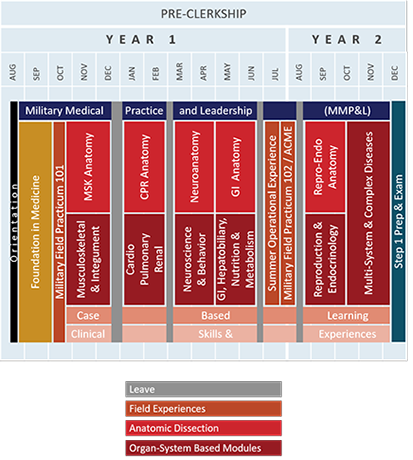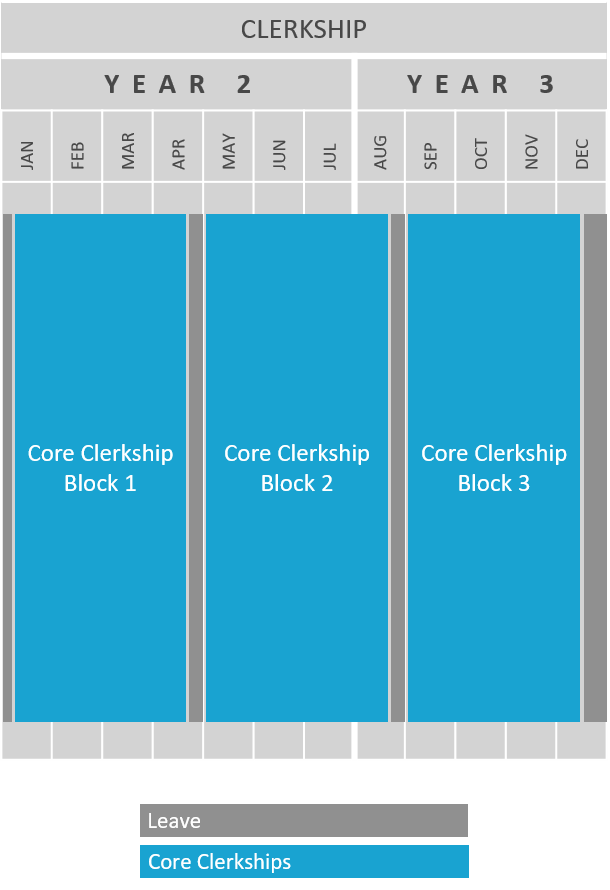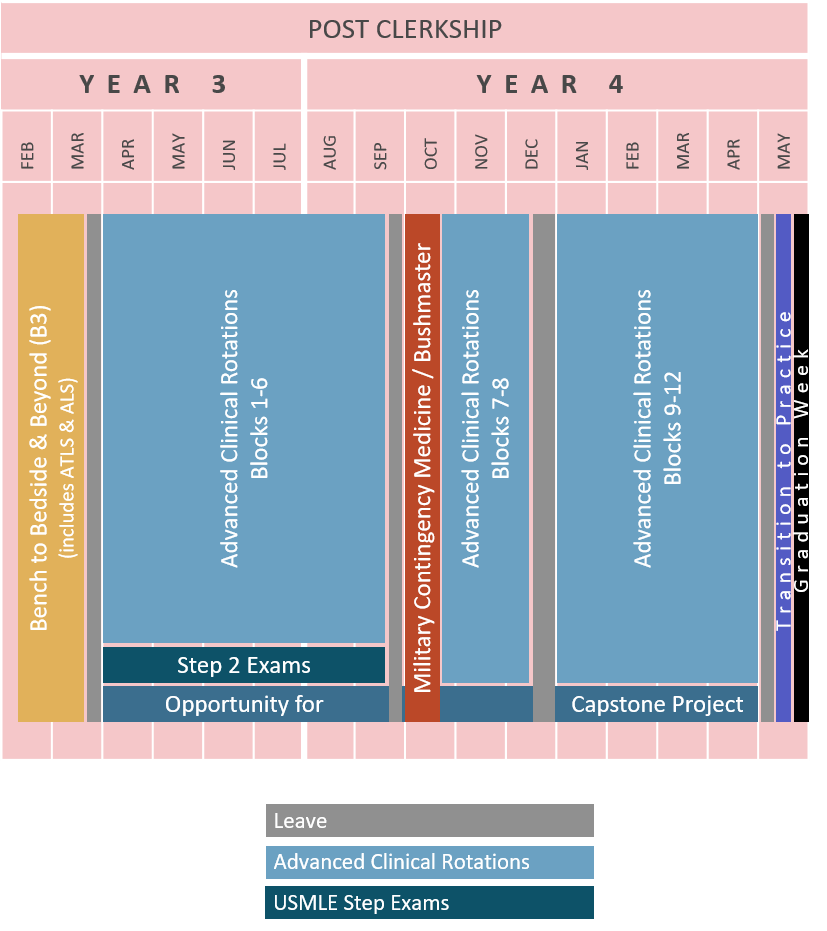PROGRAM DESCRIPTION
The MD/PhD Program at USU was established to train outstanding, dedicated, military officers as independent physician-scientists to carry out both clinical investigations and biomedical research in the basic sciences. The program combines a rigorous basic science graduate curriculum with outstanding clinical training, and special integrated MD/PhD activities that qualify students for careers in academic medicine biomedical and clinical research, as well as clinical practice.
The decision to enter this program is formidable and requires the student to dedicate 7-8 years to complete this challenging combination of medical and scientific training. Entering students must demonstrate a high level of preparedness, outstanding academic credentials, motivation and commitment to the goals of the program. Matriculants to the MD/PhD Program must maintain all requirements necessary to be commissioned into the United States military throughout the PhD portion of his/her training.
Students enter the program as civilian graduate students, and commission into their respective military branches (Army, Navy, Air Force, or Public Health Service) three years into their training at USU. The PhD component is completed in one of three interdisciplinary programs (EID, MCB, NES) or in Public Health (PH students must have an MPH prior to entry into the program). At the end of the first year of their graduate training, students will write and defend their qualifying exam. Students must complete their thesis research in three years (prior to entering their clerkship training). 1/3 of our students write and defend their thesis prior to returning to the medical school curriculum, while the remaining 2/3 will write and defend their thesis after their required clerkships. Similar to MD graduates of USU, graduates of the MD/PhD program will complete a residency within the Military Health System. After finishing their residency, graduates have a seven-ten year military commitment depending on their specific military branch.
CURRICULUM
The curriculum combines and integrates the requirements for both the MD and PhD degrees. The MD/PhD program consists of three phases: Pre-clerkship Phase (medical school), graduate thesis work, and required clerkships and post-clerkship phase (medical school). Students will also complete 1-2 laboratory rotations in the summer before the pre-clerkship phase. The typical time-frame for completion of the MD/PhD program at USU is seven years.
Laboratory Rotations
Students enter our program in June prior to their first year of medical school, and complete 1-2 laboratory rotations prior to their pre-clerkship training. An additional laboratory rotation can be scheduled at the end of the student’s pre-clerkship training prior to joining a laboratory.
Pre-clerkship training (1 ½ years)
MD/PhD students will join the incoming medical school class in mid-August for orientation, and undertake their required pre-clerkship coursework including seven systems-based “modules” and military-specific training including: Bushmaster, a summer operational experience, and military medical practice and leadership training. At the completion of this stage, students will take the USMLE Step 1 exam prior to beginning their graduate coursework.
PhD training (3 years)
Students will engage in a rigorous, accelerated PhD program that includes advanced graduate-level coursework relevant to their field of study and a qualifying examination at the end of year one of their PhD training prior to their advancement to candidacy. Students will commission as a military officer half way through their graduate education (end of year 3), at which time they will attend branch specific officer training for approximately six weeks. Following advancement to candidacy, students will complete their thesis research, write, and defend their doctoral dissertation.
Clerkship and post-clerkship (2 ½ years)
Students will re-enter the medical school curriculum with students who have just finished their pre-clerkship training. The clerkship training includes: required clerkships (48 weeks), bench-to-bedside and beyond (B3) coursework that ties advanced basic science concepts with clinical concepts (6 weeks), advanced clinical rotations (12 × four-week blocks).
After completing both program requirements, the student will be awarded both the MD and PhD degrees and commission as an active duty officer (O-3) at commencement.
PRE-CLERKSHIP (61 CREDITS)
PRC1001 Foundation in Medicine - 7 credits
PRC2001 Musculoskeletal/Integument - 8 credits
PRC2002 Cardiopulmonary/Renal - 9 credits
PRC2003 Neuroscience and Behavior - 8 credits
PRC2004 Gastrointestinal, Hepatobiliary, Metabolism & Nutrition Module - 8 credits
PRC2005 Reproduction and Endocrinology Module - 7 credits
PRC2006 Complex and Multi-System Diseases Module - 8 credits
PRC2007 Military Medical Practice (Includes Summer Operational Experience) - 6 credits
GRADUATE SCHOOL (144 CREDITS)
MD/PhD students take 12 credit hours per quarter. Course requirements vary between graduate programs. For the interdisciplinary graduate programs, requirements include 2-3 upper level graduate courses, seminar, journal club, and research credits.
CLERKSHIP
Following a 10 day orientation session in which students are introduced to their roles and responsibilities associated with the inpatient and outpatient clinical environments, students participate in a total of 48 weeks of required clinical clerkships, which are accomplished in three sixteen week blocks. The blocks may be completed in any order, but each block involves completion of a paired set of clinical clerkships, that incorporate the integration of key clinical and basic science themes or “threads”. Learn more about clerkships here >
Block 1
MD03001 Inpatient Medicine - XX credits
XXXXXXX Outpatient Medicine - XX credits
PS03001 Psychiatry - XX credits
Block 2
FM03001 Family Medicine - XX credits
PD03001 Pediatrics - XX credits
XXXXXXX Selective/EM/Neurology - XX credits
Block 3
SU03001 General Surgery - XX credits
XXXXXXX Surgical Specialties - XX credits
OB03001 Obstetrics and Gynecology - XX credits
POST CLERKSHIP
The first six-weeks of the post-clerkship phase helps students prepare for successful completion of Step 1 of the USMLE exam. Students then have a six-week period of advanced curricular instruction entitled “Bench to Bedside and Beyond” (B3). B3 is an opportunity for students to further integrate basic science and clinical concepts in an advanced context. After B3, students complete rotations with prospective residency sites and further enhance clinical skills and opportunities. Offerings include medical and surgical, ambulatory and inpatient rotations, research electives, operational medicine electives, as well as traditional sub-internships. During this period, students will complete Part 2 of their board examinations (USMLE Step 2 Clinical Skills and Clinical Knowledge).
XXXXXXX Bench to Bedside and Beyond - XX credits
Surgical discipline (choose two)
XXXXXXX General Surgery - XX credits
XXXXXXX Ob/Gyn - XX credits
XXXXXXX Orthopedics - XX credits
XXXXXXX Urology - XX credits
XXXXXXX ENT - XX credits
Medical discipline (choose two)
XXXXXXX Family Medicine - XX credits
XXXXXXX Internal Medicine - XX credits
XXXXXXX Pediatrics - XX credits
XXXXXXX Military Contingency Medicine - XX credits
*Students are encouraged to complete an elective in behavioral health
*Advanced Clinical Rotations includes traditional sub-internships, clinical electives, operational/humanitarian rotations, and/or specialized research (including Capstone Project)
UNITED STATES MEDICAL LICENSING EXAMINATION
In addition to fulfilling the academic and personal requirements to graduate from the School of Medicine, students must take and pass Step 1, Step 2-CK (Clinical Knowledge), and Step 2-CS (Clinical Skills Examination) of the United States Medical Licensing Examination (USMLE). All three parts of the examination are administered annually by the National Board of Medical Examiners (NBME).
Students are expected to take their Step 1 examination following the completion of their core clerkships (January of MS-III year). The Step 1 examination assesses whether medical students can apply important basic science concepts to the practice of medicine.
Step 2-CK is taken towards the end of the MS-III year or early in the MS-IV year (April to September) and assesses whether medical students can apply the medical knowledge and clinical skills essential for the provision of patient care under supervision, and includes an emphasis on health promotion and disease prevention.
Step 2-CS is taken after Step 2-CK, and is to be completed by November of the senior year. Step 2-CS uses standardized patients to assess a medical student’s ability to gather information from patients, perform physical examinations, and communicate their findings. Fees for all parts of the USMLE are paid by the School of Medicine.
These examinations are used by the school, along with other assessments, to determine cognitive mastery in a range of subject material. Performance on the USMLE is recorded on the student’s official transcript as pass/fail. Because the faculty regards the ability to pass all components of the USMLE as evidence of minimal competence, any student who fails either Step 1, Step 2-CK, and/or Step 2-CS, will be formally reviewed by the Student Promotions Committee.
FIELD EXERCISES
ANTIETAM
First-year medical students gain unique perspectives on the evolution of military medicine during the annual march across the Antietam National Battlefield, the bloodiest one-day battle in American history. Students tread six miles of these storied fields to learn about the medical advancements made and the obstacles military personnel faced when providing care during the Civil War.
ADVANCED COMBAT MEDICAL EXPERIENCE (ACME)
In the midst of battle, casualties have to be assessed and stabilized long before injured service members ever see a hospital. ACME develops and reinforces the knowledge, skills, and attitudes necessary to perform effective pre-hospital assessment and stabilization of combat wounded casualties.
OPERATION BUSHMASTER
Operation Bushmaster serves as the exam for the Military and Contingency Medicine course. Taking place on a simulated battlefield, the assessment covers a broad range of topics from advanced trauma life support to preventive medicine and patient care in flight to military medical ethics. Students live in field conditions and work in teams, rotating through positions as commanders, executive officers, medical officers, and ambulance team leaders. The assessment culminates in a mass casualty exercise in which an entire platoon is seriously injured where students must triage the wounded while arranging for their evacuation.
More information about Field Exercises >
APPLICATION REQUIREMENTS
Applicants interested must first apply directly to the School of Medicine through AMCAS and indicate their interest in the MD/PhD program on the AMCAS application. A completed USU PhD Program Application must separately be submitted to the USU Office of Graduate education
If the applicant is not accepted into a PhD program, they may still continue the medical school application process.
AMCAS
Applicants must complete an application through the online American Medical College Application Service (AMCAS) at www.aamc.org.
Applicants who are selected for medical school interviews at USU will be invited to apply through the portal. Please note that applications that do not come through AMCAS will not be considered.
Applicants entering the program with regular status are expected to have completed course work required for a bachelor's degree in chemistry, cell biology, biochemistry, biophysics, genetics, molecular biology or microbiology.
Deadline
The AMCAS application period begins in late May and terminates on or before December 15 prior to the year in which the applicant anticipates enrollment.
PHD APPLICATION
- Academic Statement of Purpose
- Supplemental Application Materials
Admission is based on an overall assessment of the qualifications submitted and the interview.
Additional Application Requirements
Deadline
December 1, 2018
FINANCIALS
TUITION AND FEES
Tuition: $0
Fees: $0
Books: $0
Equipment: $0
Healthcare: $0
Housing allowance: ~$28k
Salary: ~$35k
Subsistence: ~$3k
Service requirement: 7-10 years upon graduation, depending on the chosen service
Students admitted to the MD/PhD Program will receive a graduate stipend from the Graduate Program for the first three years. In most cases, the MD/PhD student will be commissioned in the United States military as an O-1, at the end of the third year in the program. Commissioning will mark the beginning of the student’s military service.
Students pay no tuition or fees and receive the full salary and benefits of a uniformed O-1 officer after commissioning. Benefits include free medical care for students and eligible family members, a housing allowance, and 30 days paid leave annually. Books and laboratory equipment are also furnished to students at no charge.
Students graduate debt free in exchange for an active duty service commitment upon graduating: seven years for Army, Navy, and Air Force, and ten years for Public Health Service. Upon acceptance, medical students commission as officers in one of the four uniformed services before beginning classes at the University. USU accepts active duty personnel, but no prior service is required for admission to USU.



